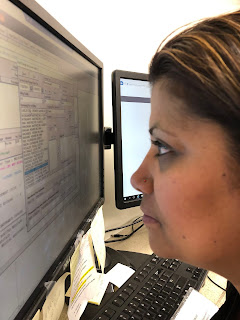
What can we do to protect ourselves, our loved ones, and especially our children?
The most important thing is to encourage limits on electronic-screen viewing. Many parents are despairing over this one, noting, “it’s too late.”
It’s not too late and it is important children learn while they are at home prudence in the area of using their eyes to view hours of social media, tv, videos, etc.
Adults need to set an example for our own good too.
So here are my top 10 ways to protect ourselves and our children from the potentially damaging effects of electronic-screen viewing.
1. Wash your face and eyelids especially with warm/hot compresses without hurting your skin every morning, every night, and ideally every time you wash your hands after bathroom breaks. Heat is the only way to naturally open the orifice of the meibomian gland (an oil gland) and gentle massaging or pressure on the glands or full blinks express the oil. This keeps the oil pumping which prevents their atrophy/death. It is similar to milking a cow: if you do not milk the cow, the mil,k will dry up.
2. Clean your eyelids and eyelashes: in addition to washing your face, consider using an eyelid cleaner at least once a week or daily, especially if you have crusting in the morning (this is not normal and can lead to loss of meibomian glands if not treated properly). These are my favorite below that I use on my eyelids and my kids eyelids. Avenova is also excellent but requires a prescription and can be very expensive if not covered by insurance: but it does not burn like diluted Tea Tree Oil does.
3. Download a blinking app on your phone, desktop. These are not perfect but at least it will try to encourage you to:
a. Blink more often
b. Look away: the mantra of “Every 20min look 20 feet away for 20 seconds” is a good start. I would vote for “Every 5 minutes fully blink and look 20 ft away.”
c. Close your eyes when you type.
d. Turn off the monitor when you can.
e. Consider Blinking Exercises to re-train your brain to blink more frequently:
https://drcremers.com/2016/09/blinking-exercises-importance-of.html
4. Encourage textbooks and reading paper books, newspapers, real books at work and school. Avoid reading newspapers or books on a screen. I know we want to save trees, but until we figure out how to regrow meibomian glands inexpensively and without pain, I would encourage patients and parents to encourage their work & schools to go back to reading real books.
5. Use your eyes for only “eye-worthy” items. If you are talking to a friend and you know what she looks like, it is ok to close your eyes purposefully for a little longer than usual to keep the meibomian glands pumping and to protect your ocular surface.
Along with this, do not allow screens at the dinner table. Avoid pulling out screens when talking to friends. Have Siri or the other voice app on your phone read your emails or articles to you (by swiping down with 2 fingers on the screen.
https://9to5mac.com/2014/10/04/ios-8-how-to-have-your-ios-device-read-text-for-you/
6. Eat a very healthy diet full of natural Omega 3’s from wild salmon, nuts and a lot of green leafy vegetables. The data on Omega 3 in helping dry eyes is very controversial, but I think it is a no brainer that we need to eat Omega 3 and green leafy vegetables, ideally fresh and not cooked to death for the health of our body. It will take years to evaluate the impace of such a diet has on preventing dry eye disease (which is a different issue really in treating dry eye disease). Thus I think it is particularly important to teach kids and ourselves to eat more natural Omega 3’s (pills if you must) and green leafy veggies (ie, spinach, kale, romaine lettuce, collard greens, brussel sprouts, or take supplement pills if you must).
7. Encourage reading at home as a family. Get rid of the big screen tv at home. This is super counter-cultural. Almost everyone we know has a big screen at home. But more and more doctors are ditching their screens at home, especially if they have kids. They know the negative effects not just on their eyes but on a person’s ability to concentrate, have a meaningful conversation, on one’s ability to have a deep spiritual life, etc.
8. Eye doctors and surgeons are concerned about the effects of Blue Light on the retina. Until we can firmly prove the extra hours of extra blue light pouring into the retina does NOT harm the delicate rods and cones of the macula, I recommend some form of blue light filter for your eyes or screen, especially for kids.








